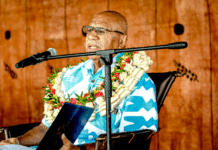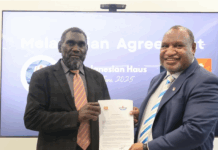
By Budi Sutrisno in Jakarta
As the death of George Floyd, an African-American man who died while being arrested in the United States, sparks a global outcry, Indonesian rights advocates and young people have stepped forward to remind fellow citizens that racism has long been an issue at home as well.
The scene of Floyd being restrained by a cop employing a knee-to-neck hold is familiar for some, who compared the incident to the 2016 case of Obby Kogoya, a Papuan man whose head was reportedly stepped on by the police before he was arrested during the siege of a Papuan student dormitory in Yogyakarta.
The hashtag #BlackLivesMatter, which has accompanied a call for street rallies worldwide, has since been adapted into #PapuanLivesMatter, with many turning to social media to urge Indonesians to also speak up against the racial discrimination and violence that Papuans have long endured.
READ MORE: Global fight against racism: Papuan lives also matter
“Many Indonesians support the hashtag #JusticeForGeorgeFloyd to denounce the actions of the American police over racial discrimination against black people. This is inversely proportional to when Papuans are racially abused,” Papuan activist Rico Tude tweeted on Tuesday.
Rico, who writes for Papuan media platform suarapapua.com, criticised the “double standards” of Indonesians in addressing the issue of racism abroad and at home, saying some might fear the risk of discussing sensitive topics related to Papua or lamented the history of Papuan political attitudes.
“Some people think that the racism experienced by Papuan people is a logical consequence that must be accepted by those who are considered separatists,” said Rico, who is also the spokesman for the Indonesian People’s Front for West Papua (FRI-WP).
While being far from the central government’s reach at home, many native Papuans have to put up with discrimination against their skin color and stereotypes while searching for a better life in other cities.
Rejection by landlords
Some students previously told The Jakarta Post that they faced rejection by landlords when looking for rooming houses to rent only because they were Papuans, while others had to endure racial slurs.
In other circumstances, such as when engaging in peaceful rallies to voice their political aspirations, many Papuans have reportedly faced physical intimidation and brutality by law enforcement personnel.
President Joko “Jokowi” Widodo has tried to reach out more with his development and infrastructure approach but critics and activists argued that Jakarta continues to fail in addressing human rights issues and the repression against their freedom of expression.
On Sunday, Indonesian human rights lawyer Veronica Koman and two native Papuans held an online discussion on how the #BlackLivesMatter campaign had echoed the Papuan movement against the long-standing racism and injustice they felt in Indonesian society.
They agreed that the string of protests against Floyd’s death were similar to what happened in Papua last year – when thousands rallied against racism after a Papuan student was called a “monkey” by security personnel in Surabaya, East Java.
“Dialogue to advocate for Papua-related issues is not enough. Unlike the Floyd case, racism in Papua continues because the public lacks knowledge of it,” said one of the speakers, Mikael Kudiai.
Cisco Mofu, another speaker, called for other Indonesians to open their minds and listen to the aspirations of Papuans and be willing to “criticise the state for its mistakes”.
Time to raise awareness
In a statement to the Post, Koman said it was time to raise awareness among the public, as people outside the activist circle, including celebrities and influencers, had also reached out for discussion.
Actress Hannah Al Rashid, for instance, is among those who have amplified such discussion and called for people to actively listen instead of making assumptions about the issue through her Twitter account.
“Let’s start speaking up for Papua. The government has been able to perpetuate impunity in Papua because the people haven’t spoken out. We do need your voices but please be mindful in amplifying Papuan voices,” Koman said.
Many internet users have also geared up to help disseminate information on issues surrounding Papua and shared links for people to sign petitions and donate to various causes to help Papuan people.
Young initiators, through online media platform Kudeta Mag, were among those who compiled the links and reading material on the website weneedtotalkaboutpapua.carrd.co.
“It should be our responsibility as Indonesians to feel obligated to understand our own country,” Kudeta Mag chief editor Jordinna Joaquin told the Post, “We need to talk, have these conversations, donate whenever and whatever we can and demand justice where it’s needed.”
Call for strong stand
Amnesty International Indonesia also called on the government to take a strong stand against systemic racism by guaranteeing Papuan rights to freedom of expression and stopping all forms of violence against those who peacefully express their opinions.
“The killing of George Floyd in Minneapolis must be a reminder that discrimination and intimidation also happens to native Papuans in Indonesia, and most of the cases have yet to be resolved,” executive director Usman Hamid said on Wednesday.
The rights group also urged the authority to immediately release 51 Papuan prisoners of conscience.
“They do not deserve to be in jail because they did not commit any crimes. Justice must be upheld,” Usman said.














































